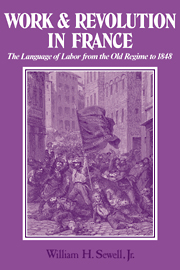Book contents
- Frontmatter
- Contents
- Preface
- 1 INTRODUCTION: SOCIAL HISTORY AND THE LANGUAGE OF LABOR
- 2 MECHANICAL ARTS AND THE CORPORATE IDIOM
- 3 JOURNEYMEN'S BROTHERHOODS
- 4 THE ABOLITION OF PRIVILEGE
- 5 FROM GENS DE MÉTIER TO SANS-CULOTTES
- 6 A REVOLUTION IN PROPERTY
- 7 INDUSTRIAL SOCIETY
- 8 WORKERS' CORPORATIONS
- 9 THE JULY REVOLUTION AND THE EMERGENCE OF CLASS CONSCIOUSNESS
- 10 THE PARADOXES OF LABOR
- 11 THE REVOLUTION OF 1848
- 12 CONCLUSION: THE DIALECTIC OF REVOLUTION
- Notes
- Bibliography
- Index
4 - THE ABOLITION OF PRIVILEGE
Published online by Cambridge University Press: 06 November 2009
- Frontmatter
- Contents
- Preface
- 1 INTRODUCTION: SOCIAL HISTORY AND THE LANGUAGE OF LABOR
- 2 MECHANICAL ARTS AND THE CORPORATE IDIOM
- 3 JOURNEYMEN'S BROTHERHOODS
- 4 THE ABOLITION OF PRIVILEGE
- 5 FROM GENS DE MÉTIER TO SANS-CULOTTES
- 6 A REVOLUTION IN PROPERTY
- 7 INDUSTRIAL SOCIETY
- 8 WORKERS' CORPORATIONS
- 9 THE JULY REVOLUTION AND THE EMERGENCE OF CLASS CONSCIOUSNESS
- 10 THE PARADOXES OF LABOR
- 11 THE REVOLUTION OF 1848
- 12 CONCLUSION: THE DIALECTIC OF REVOLUTION
- Notes
- Bibliography
- Index
Summary
THE FRENCH REVOLUTION was not just a change in the form and personnel of government. It was a radical transformation of the entire social order, from politics to private morality, from the army to education, from taxation to the maintenance of public order, from weights and measures to calendrical reckoning, from science and philosophy to agriculture and the mechanical arts. In the eyes of its makers, the Revolution swept away a corrupt society based on privilege, despotism, and supersitition and replaced it with a society based on the invariant laws of nature and the crystalline simplicity of reason, in which equality under the law and the liberty of the individual citizen would be at once the foundation and the goal of public life. However violently they may have disagreed about its practical implementation, all the great revolutionary leaders, from Sieyes and Mirabeau to Brissot and Condorcet to Danton and Marat to Robespierre and Saint-Just, shared this vision of the Revolution as the victory of reason and nature over superstition and privilege. The French Revolution was a self-conscious attempt to dismantle the hierarchical social framework of the old regime and to shatter the metaphysical assumptions on which it depended. In carrying out what they saw as a salutary act of destruction, the revolutionaries abolished trade corporations along with all the other privileged corporate bodies that constituted the traditional monarchical state.
The abolition of corporations must be understood as part of this general destruction of the corporate social order, not as a result of processes internal to the world of mechanical arts.
- Type
- Chapter
- Information
- Work and Revolution in FranceThe Language of Labor from the Old Regime to 1848, pp. 62 - 91Publisher: Cambridge University PressPrint publication year: 1980



